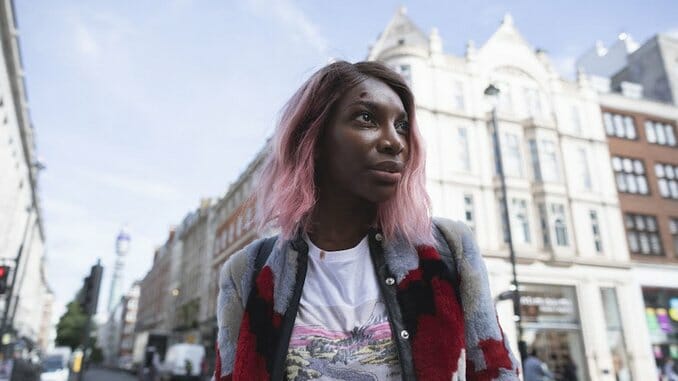HBO’s I May Destroy You Is a Challenging Odyssey Through Modern Dating and Sexual Consent
Photo Courtesy of HBO
There may be few series as difficult but as important right now as Michaela Coel’s new 12-episode HBO show I May Destroy You. The Ghanaian-British creator and star explores the pain, confusion, and eventual road to healing regarding the rape experienced by her London-based lead, Arabella. Playing out as a series of vignettes, the season is tied together by a close-knit group of friends who must confront everything from their own biases to sexual crimes perpetrated against them.
The half-hour series begins with Arabella returning from an Italian sojourn to visit Biagio (Marouane Zotti), a local drug dealer with whom she wants to have an actual relationship. His reticence sets up the first of many romantic disappointments, a theme throughout this episode and the season as a whole. Back in London, Arabella is being pushed to finish the manuscript for a book that landed with a major publisher, but in the middle of her all-nighter she goes out to meet up with friends at a bar where she is later drugged and date raped.
The events of that night come back to Arabella in confused flashes, and while she does go to the police and ultimately seeks therapy, she is hesitant to believe the worst—or even (initially) that anything happened at all. With Arabella, Coel gives us a young woman who is not trying to be a poster child. She is a mess, and the book that she is trying to write becomes the show that we are watching and ultimately experiencing with her. When she tries to go back to “normal” after her assault with a casual hookup, it turns into another kind of rape. Later, attending a support group for survivors, she says the most heartbreaking line of the entire series: “I’m here to try and find out how to not get raped.”
Arabella’s experiences are harrowing, but her reporting the crime and finding support are given a clearer path than that of her friend Kwame (Paapa Essiedu), a gay man who engaged in consensual sex followed by assault. Like Arabella, Kwame wants justice for what happened while also wanting to pretend it didn’t happen—something that is made all the more difficult by a horribly botched encounter with police when making the report. Arabella’s best friend and roommate, Terry (a dynamic Weruche Opia) is also is forced to reconsider a sexual encounter she had in Italy that she thought was freeing, but was in fact likely a setup.
All of this is rough, but the series takes on a loose structure to tell its stories. It’s not often clear where things are going, episode to episode, and resolutions are not always tangible. Some kind of closure is ultimately available to Arabella in a strong season finale, but there is still a lot left unexplored. And while we get to know Arabella exceptionally well throughout the season, we never know Terry or Kwame quite as three-dimensionally, despite spending so much time with them. Their own endings are rushed and tacked-on, as if to find something positive out of all of this pain, but in a way that doesn’t feel earned after so much time spent in the wilderness. The road to happiness deserves space, too.